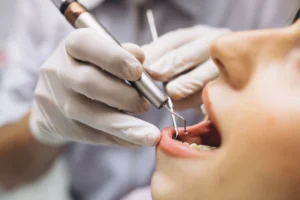Dental Implants acts like the natural teeth
One of the biggest advantages of an implant is that it restores full masticatory power. Most patients can’t tell the difference between their natural teeth and the implant tooth. They can eat, brush and floss normally as if they have their own natural teeth.
Dental Implants could last a lifetime
Whereas a dental bridge may only last around 5-10 years or so, dental implants can last a lifetime. The implant is made from titanium and integrates with the jawbone. It’s bio-compatible, meaning that it’s non-toxic and not rejected by the body. It is an excellent option for replacement of a lost tooth.
Dental Implants prevent bone loss
Where you lose a tooth, the jawbone in the empty space deteriorates due to lack of stimulation. If no implant is placed in the first year of losing a tooth, that bone area loses 25% of its volume, and bone loss continues over the years.
Dentures can even accelerate bone loss as they often become loose, and rub against the bony ridge, gradually wearing it away. Because an implant replaces the root as well as the tooth, and gives normal mastication power, it provides the needed stimulation for natural bone growth.
Dental Implants keep adjacent teeth stable
The gap from a missing tooth can cause adjacent teeth to shift towards the gap. This pulls your teeth out of position and can affect your bite, your ability to chew and your appearance. It can cause interference that makes tooth replacement more complicated. A poor bite can also lead to issues with your TMJ (temporomandibular joint) and may result in pain and headaches.
Dental Implants can help keep you free of gum disease
A missing tooth gap can act as a trap for food and bacteria and can lead to gum disease.
Dental Implants can prevent facial sagging and early aging
Facial sagging can be an unwanted effect of bone loss resulting from missing teeth. This is where the lower third of the face starts to collapse, gradually closing the distance between the tip of the nose and the chin. Changes can include excess wrinkles around the mouth, thinning lips and a more pointed chin, making the person look a lot older than his or her true age.
Dental Implants vs. Dentures
Stable teeth with good chewing power!
Dental implants provide a far superior experience compared to dentures. Even dentures that originally fit the patient well begin to slip and become uncomfortable after a while, due to increasing bone loss.
It’s difficult to keep any denture continually stable due to wear on the bony ridges that dentures clasp onto. The most frustrating aspect of dentures, and the unhealthiest, is their poor chewing ability. many have to limit their diets because they are unable to chew certain foods with their dentures.
If you are deciding between traditional dentures or an implant-supported restoration, here are some things to consider.
- Dentures often need to be kept in the mouth by using a dental adhesive. This sometimes requires re-glues after meals. An implant-supported denture requires no adhesive.
- Dentures need to be removed for cleaning. With the exception of a removable implant-retained denture, your implant-supported restoration can be cared for by brushing and flossing.
- Dentures cover the roof of the mouth. With implants, there’s nothing covering the roof of your mouth to interfere with your sense of taste or other normal activities. Implant-supported dentures can also be fabricated without a palate.
- Dentures can slip out while eating or speaking. Implants and implant-supported dentures are securely anchored and won’t slip out.
- It’s hard to chew with dentures and you can’t eat a lot of food you like or need. Dentures can move while you chew, which is annoying, and also makes it difficult to chew! In fact, dentures generally have only 10% or less of full chewing power. Dental implants have full chewing power and implant-supported bridges or dentures also considerably increase the chewing power.
- Dentures may click while eating. With implants or implant-supported dentures, there’s no annoying clicking sound.
- Dentures don’t provide the stimulation needed to prevent bone loss. The jawbone needs to have the stimulation of high-pressure chewing to keep its volume. Implants ensure no jaw bone is lost.
- Progressive bone loss as a result of wearing dentures can cause facial collapse. Over the years bone loss can cause the collapse of the lower third of your face, creating excessive wrinkles, sagging skin and jowls, thinning lips and a sunken-in look. This can considerably age a person’s appearance. Implants prevent bone loss.
Dental Implants vs. Dental bridges
A Dental Implant is a more affordable and natural replacement than a Dental Bridge
A bridge consists of a false tooth (or teeth) supported by adjacent teeth that have been capped. It is used to replace one or two missing teeth.
A bridge requires two often healthy teeth to be altered, which is not an ideal way of replacing a missing tooth compared to a dental implant. Bridges tend to have short lives, five to ten years, compared to a dental implant, which can last a lifetime. So while a bridge can sometimes be more economical at first, in the long run a dental implant can cost you less.










